Daily Vocabulary Words: List of Daily Used Words
Hi there. Welcome to this special section @ Wordpandit.
Our endeavour here is straightforward: highlighting important daily vocabulary words, you would encounter in The Hindu. This is your repository of commonly used words; essentially, we are posting a list of daily used words. Hence, this has significant practical application as it teaches you words that are commonly used in a leading publication such as The Hindu.
Visit the website daily to learn words from The Hindu.
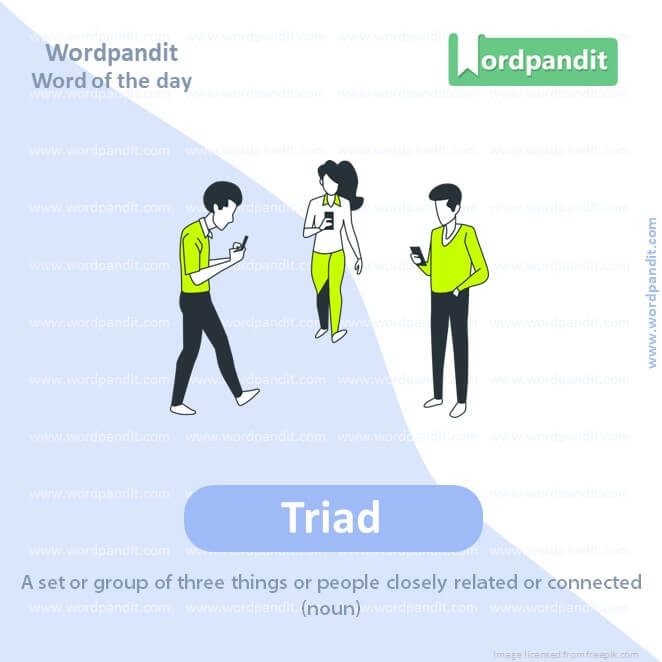
WORD-1: Triad
CONTEXT: The all-too-familiar triad of historical periodisation — ancient, medieval, modern — now universal, has rather specific provincial and temporal origins. All societies evolved their own modes of dividing their history into periods: dynastic and regnal was the one prevalent in India, Iran, the Turko-Mongol regions, besides Europe. The creation of eras, such as Vikrami, Shaka, and Ilahi or the era of piety in Islam coinciding with the Prophet and the first four caliphs and the steady decline afterwards were among many other modes.
SOURCE: The Hindu
EXPLANATORY PARAGRAPH: Think of a group of three best friends who always do things together. A triad is like that. It’s when three things or people are connected or grouped together.
MEANING: A set or group of three things or people closely related or connected (noun).
PRONUNCIATION: try-ad
SYNONYMS: Trio, Threesome, Triple, Triplet, Trifecta, Triumvirate, Triad
USAGE EXAMPLES:
1. The triad of friends went on an adventure together.
2. The music had a beautiful triad of harmonies.
3. The project was led by a triad of experts.
4. The story revolves around a triad of main characters.
WORD-2: Periodisation
CONTEXT: The all-too-familiar triad of historical periodisation — ancient, medieval, modern — now universal, has rather specific provincial and temporal origins. All societies evolved their own modes of dividing their history into periods: dynastic and regnal was the one prevalent in India, Iran, the Turko-Mongol regions, besides Europe. The creation of eras, such as Vikrami, Shaka, and Ilahi or the era of piety in Islam coinciding with the Prophet and the first four caliphs and the steady decline afterwards were among many other modes.
SOURCE: The Hindu
EXPLANATORY PARAGRAPH: Imagine putting your toys into groups based on when you got them: new toys, old toys, and oldest toys. Periodisation is like that. It’s dividing history or time into different parts based on events or changes.
MEANING: The division of history into different periods or stages to better understand or study it (noun).
PRONUNCIATION: peer-ee-uhd-eye-zay-shun
SYNONYMS: Division, Categorization, Classification, Segmentation, Chronology, Grouping, Arrangement
USAGE EXAMPLES:
1. Periodisation in history helps us understand different eras better.
2. The textbook used periodisation to explain the progression of events.
3. Periodisation of art movements helps in their study.
4. The periodisation of the author’s works made them easier to analyze.
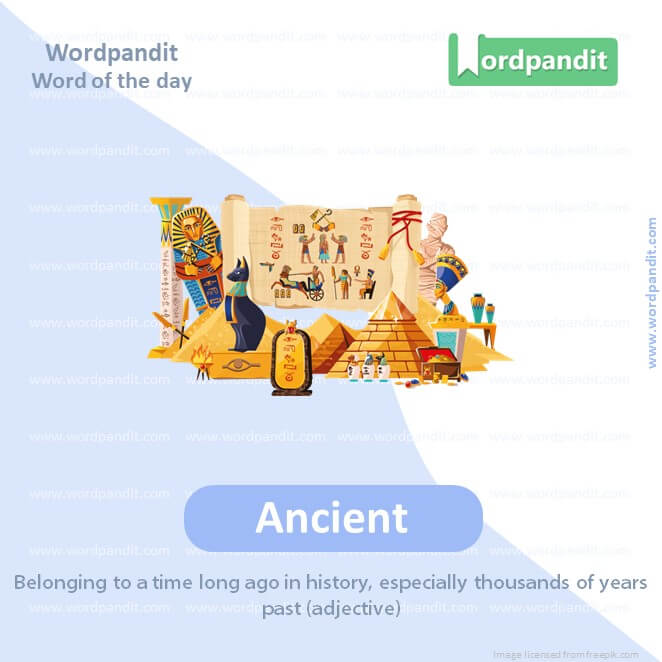
WORD-3: Ancient
CONTEXT: The all-too-familiar triad of historical periodisation — ancient, medieval, modern — now universal, has rather specific provincial and temporal origins. All societies evolved their own modes of dividing their history into periods: dynastic and regnal was the one prevalent in India, Iran, the Turko-Mongol regions, besides Europe. The creation of eras, such as Vikrami, Shaka, and Ilahi or the era of piety in Islam coinciding with the Prophet and the first four caliphs and the steady decline afterwards were among many other modes.
SOURCE: The Hindu
EXPLANATORY PARAGRAPH: Ancient means something that is very, very old. Like the dinosaurs or old castles that were built a long, long time ago. It’s from a time so far back that it’s hard to imagine.
MEANING: Belonging to a time long ago in history, especially thousands of years past (adjective).
PRONUNCIATION: ayn-shuhnt
SYNONYMS: Old, Antique, Archaic, Age-old, Primitive, Historic, Ancestral
USAGE EXAMPLES:
1. The museum had many ancient artifacts.
2. They visited the ancient ruins of the city.
3. Ancient civilizations like Egypt fascinate historians.
4. The tradition is as ancient as the hills.
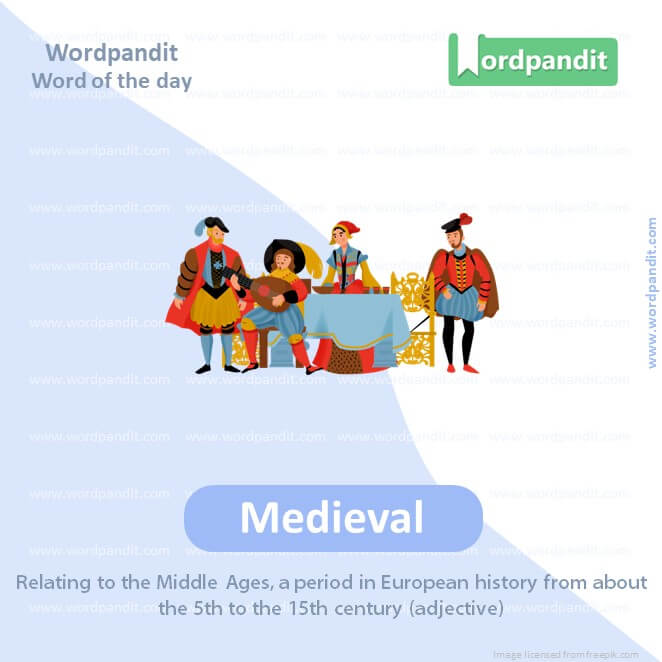
WORD-4: Medieval
CONTEXT: The all-too-familiar triad of historical periodisation — ancient, medieval, modern — now universal, has rather specific provincial and temporal origins. All societies evolved their own modes of dividing their history into periods: dynastic and regnal was the one prevalent in India, Iran, the Turko-Mongol regions, besides Europe. The creation of eras, such as Vikrami, Shaka, and Ilahi or the era of piety in Islam coinciding with the Prophet and the first four caliphs and the steady decline afterwards were among many other modes.
SOURCE: The Hindu
EXPLANATORY PARAGRAPH: Think about a time long ago with castles, knights, and dragons. Medieval is a word that describes things from this time, about 500 to 1500 years ago. It’s like a fairy tale world from a very long time ago.
MEANING: Relating to the Middle Ages, a period in European history from about the 5th to the 15th century (adjective).
PRONUNCIATION: mee-dee-ee-vuhl
SYNONYMS: Middle Ages, Dark Ages, Gothic, Feudal, Old-fashioned, Knightly, Bygone
USAGE EXAMPLES:
1. The castle is a fine example of medieval architecture.
2. They studied medieval history at school.
3. Medieval literature includes many epic tales.
4. The festival featured a medieval-themed banquet.
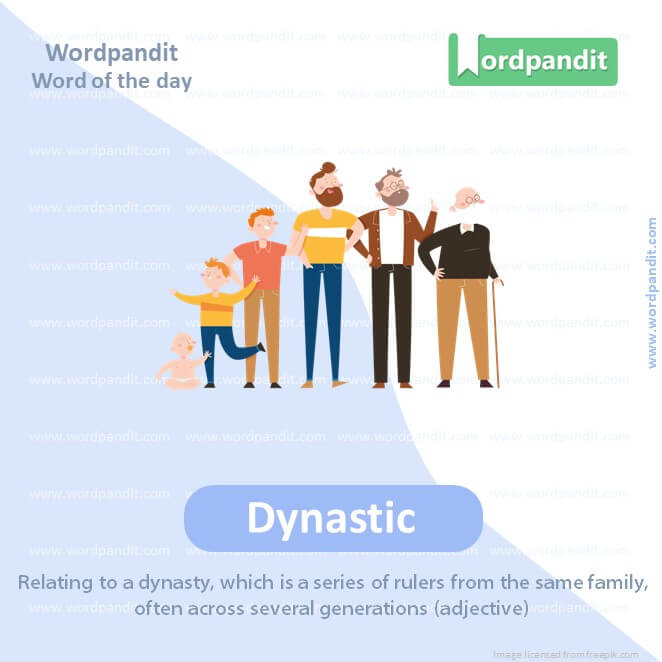
WORD-5: Dynastic
CONTEXT: The all-too-familiar triad of historical periodisation — ancient, medieval, modern — now universal, has rather specific provincial and temporal origins. All societies evolved their own modes of dividing their history into periods: dynastic and regnal was the one prevalent in India, Iran, the Turko-Mongol regions, besides Europe. The creation of eras, such as Vikrami, Shaka, and Ilahi or the era of piety in Islam coinciding with the Prophet and the first four caliphs and the steady decline afterwards were among many other modes.
SOURCE: The Hindu
EXPLANATORY PARAGRAPH: Dynastic is a word that talks about a family, especially a royal or important one, that has been in charge for a long time, like kings and queens from the same family ruling over many years.
MEANING: Relating to a dynasty, which is a series of rulers from the same family, often across several generations (adjective).
PRONUNCIATION: dy-nas-tik
SYNONYMS: Hereditary, Royal, Regal, Lineal, Monarchical, Successional, Aristocratic
USAGE EXAMPLES:
1. The museum exhibited artifacts from various dynastic periods.
2. The country was ruled by a dynastic monarchy for centuries.
3. Dynastic politics dominated the region’s history.
4. The film explored the dynastic struggles of medieval times.
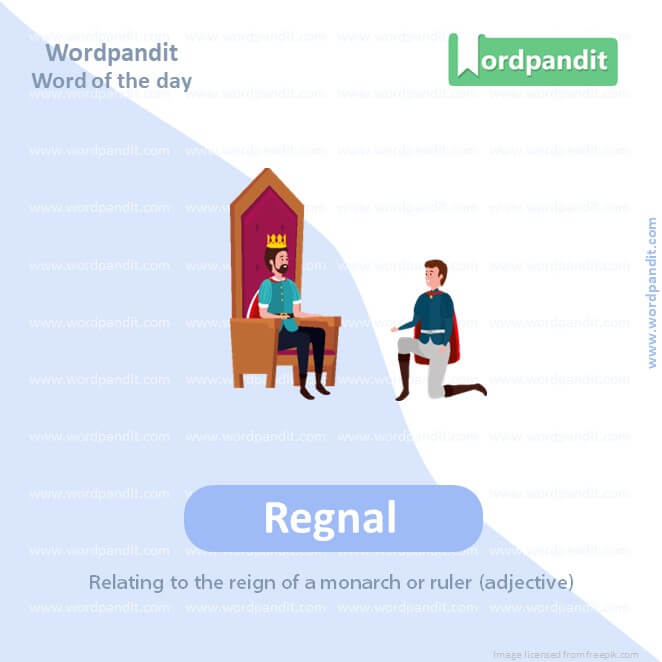
WORD-6: Regnal
CONTEXT: The all-too-familiar triad of historical periodisation — ancient, medieval, modern — now universal, has rather specific provincial and temporal origins. All societies evolved their own modes of dividing their history into periods: dynastic and regnal was the one prevalent in India, Iran, the Turko-Mongol regions, besides Europe. The creation of eras, such as Vikrami, Shaka, and Ilahi or the era of piety in Islam coinciding with the Prophet and the first four caliphs and the steady decline afterwards were among many other modes.
SOURCE: The Hindu
EXPLANATORY PARAGRAPH: Regnal is a word used to talk about a king or queen’s rule. When we say something happened in a king’s regnal year, it means it happened during the time that king was in charge.
MEANING: Relating to the reign of a monarch or ruler (adjective).
PRONUNCIATION: reg-nuhl
SYNONYMS: Reigning, Sovereign, Monarchical, Royal, Imperial, Throne-related, Kingly
USAGE EXAMPLES:
1. The coin was minted in the fifth regnal year of the king.
2. Regnal numbers are used to distinguish monarchs with the same name.
3. The regnal period was marked by prosperity.
4. Events were often dated by regnal years in historical documents.
WORD-7: Piety
CONTEXT: The all-too-familiar triad took birth in Europe around the 16th-17th centuries, first in the history of theology and steadily in society’s history, finding its largely evolved form in 1688 at the hands of Cellarius, a German. This was the era when over the past few centuries, Europe had been creating its new self-image of rationality, science and progress, in short, modernity; to reinforce it, the inverse image of its immediate past, the medieval, was also created as one of irrationality, regression, and superstition which were constituted as the synonym of religion/religiosity — in short, the “Dark Age” from which Europe was progressing into Enlightenment.
SOURCE: The Hindu
EXPLANATORY PARAGRAPH: Piety is when someone shows a lot of respect and love for their religion or God. It’s like when you really believe in something and show it by praying, being kind, and following the rules of your religion.
MEANING: The quality of being religious or reverent, showing deep respect for God and religion (noun).
PRONUNCIATION: py-uh-tee
SYNONYMS: Devoutness, Holiness, Spirituality, Reverence, Godliness, Faithfulness, Sanctity
USAGE EXAMPLES:
1. Her piety was evident in her daily life.
2. The monk was known for his deep piety.
3. Acts of piety include prayer and charity.
4. The festival was a celebration of religious piety.
WORD-8: Caliphs
CONTEXT: The all-too-familiar triad took birth in Europe around the 16th-17th centuries, first in the history of theology and steadily in society’s history, finding its largely evolved form in 1688 at the hands of Cellarius, a German. This was the era when over the past few centuries, Europe had been creating its new self-image of rationality, science and progress, in short, modernity; to reinforce it, the inverse image of its immediate past, the medieval, was also created as one of irrationality, regression, and superstition which were constituted as the synonym of religion/religiosity — in short, the “Dark Age” from which Europe was progressing into Enlightenment.
SOURCE: The Hindu
EXPLANATORY PARAGRAPH: Caliphs are like very important leaders in the Muslim religion. They are like kings who also have religious duties. They help make decisions and guide people in following the religion.
MEANING: The religious and political leaders of a Muslim community, considered to be successors to Muhammad (noun).
PRONUNCIATION: kay-lifs
SYNONYMS: Rulers, Emirs, Sultans, Commanders, Leaders, Authorities, Monarchs
USAGE EXAMPLES:
1. The caliphs played a significant role in expanding the Islamic empire.
2. Stories of the caliphs are an important part of Islamic history.
3. The caliphs were known for their wisdom and leadership.
4. The golden age of Islam flourished under the rule of the caliphs.
WORD-9: Theology
CONTEXT: The triad took birth in Europe around the 16th-17th centuries, first in the history of theology and steadily in society’s history, finding its largely evolved form in 1688 at the hands of Cellarius, a German. This was the era when over the past few centuries, Europe had been creating its new self-image of rationality, science and progress, in short, modernity; to reinforce it, the inverse image of its immediate past, the medieval, was also created as one of irrationality, regression, and superstition which were constituted as the synonym of religion/religiosity — in short, the “Dark Age” from which Europe was progressing into Enlightenment.
SOURCE: The Hindu
EXPLANATORY PARAGRAPH: Theology is like learning all about what different religions believe. It’s studying God, what people think about God, and the rules and stories of different religions. It’s like going to school to learn about religion.
MEANING: The study of the nature of God, religious beliefs, and religious experiences (noun).
PRONUNCIATION: thee-ol-uh-jee
SYNONYMS: Religious studies, Divinity, Doctrine, Church studies, Creed, Spirituality, Faith study
USAGE EXAMPLES:
1. He studied theology at the university.
2. Theology helps us understand different religious perspectives.
3. The book offers an interesting approach to Christian theology.
4. The conference discussed various aspects of Islamic theology.
WORD-10: Regression
CONTEXT: The triad took birth in Europe around the 16th-17th centuries, first in the history of theology and steadily in society’s history, finding its largely evolved form in 1688 at the hands of Cellarius, a German. This was the era when over the past few centuries, Europe had been creating its new self-image of rationality, science and progress, in short, modernity; to reinforce it, the inverse image of its immediate past, the medieval, was also created as one of irrationality, regression, and superstition which were constituted as the synonym of religion/religiosity — in short, the “Dark Age” from which Europe was progressing into Enlightenment.
SOURCE: The Hindu
EXPLANATORY PARAGRAPH: Imagine you learned how to ride a bike, but then you start using training wheels again. Regression is like going backward instead of moving forward. It’s when things go back to an earlier state or become less advanced.
MEANING: A return to a previous, less advanced or less developed state (noun).
PRONUNCIATION: reh-gresh-uhn
SYNONYMS: Retreat, Backward step, Reversion, Relapse, Retrogression, Decline, Reversal
USAGE EXAMPLES:
1. The company’s regression in innovation disappointed investors.
2. After his injury, the athlete faced a regression in his skills.
3. The project experienced a regression due to lack of funding.
4. Regression in childhood development can sometimes occur.
Vocabulary Daily Use
In the fascinating world of language learning, we often concentrate on taking giant leaps, but the real magic lies in the small steps of ‘vocabulary daily use’. These frequently used words and phrases form the backbone of practical communication and understanding. Therefore, mastering ‘vocabulary daily use’ is a crucial element in achieving language fluency.
To effectively learn ‘vocabulary daily use’, one needs to venture beyond the traditional textbook resources. The real essence of these words unveils itself in everyday exposure and interactions. Engaging with a variety of material like novels, magazines, newspapers, podcasts, films and digital content deepens the understanding of ‘vocabulary daily use’. Immersion in these contexts yield natural, everyday language that bridges the gap between the classroom and the real world.
The journey of mastering ‘vocabulary daily use’ necessitates the integration of innovative memory techniques. Flashcards and the Leitner System aid in embedding these words into your long-term memory by promoting active recall. Additionally, the use of mnemonic devices, which allow you to associate ‘vocabulary daily use’ with personal and familiar narratives, can enhance your ability to remember and recall these words.
Moreover, it’s important to remember that ‘vocabulary daily use’ isn’t just about comprehension- it’s about practice and active usage. Incorporate these words in your day-to-day communication and social interactions. This not only solidifies your understanding but also accelerates learning and internalization of ‘vocabulary daily use’.
In a nutshell, mastering ‘vocabulary daily use’ is a continual process that demands exposure, creative learning strategies and assertive practice. The commingling of these tactics brews the perfect formula that allows learners to seamlessly integrate ‘vocabulary daily use’ into their linguistic repertoire. And with that, they can navigate the nuances of language with confidence and ease.













